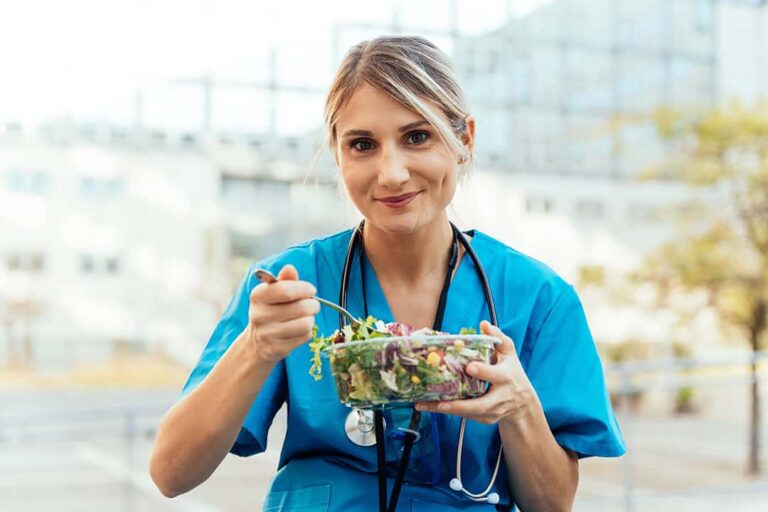Written by Catherine Hamilton, Nursing Faculty at Arizona College of Nursing – Salt Lake City.
As nurses, our focus is on our patients, communities, and family. Last in line is often taking care of ourselves. However, our patients, communities, and families suffer if we are not giving from our healthiest selves. Self-care practices are crucial for being an effective nurse, and nutrition plays a big part in self-care.
Nursing is a demanding profession, and one day is always different from the next. It can be easy to grab the first thing available, which often is not the best choice for our health. In addition, the latest diet or social media craze can make us confused about what we should and should not be eating.
For me, how I eat is a matter of life and death. I have learned that consistency is essential through years of wearing an insulin pump. I am also an active person and love hiking, biking, and running. To participate in those activities, I need food that sustains my energy. I have never been on a “diet,” but I try to keep my diet consistent and exercise to stabilize my blood sugars. A consistent eating plan has been the key to maintaining good health and being my best for patients and students.
To be consistent with your eating plan, you must find what works best for you. Research from the National Institute of Health finds only about 20% of Americans who lose weight keep it off. Some popular diets can limit important nutrients and even cause health concerns. Rather than trying different diets that often cause weight to fall, then climb back up after the diet, get to know your body. Pay attention to what you eat and how you feel. For example, does a steady diet of snack foods leave your body depleted and tired? Are there particular foods and meals that give you endurance?
What foods have worked for me? First, lean protein is vital throughout the day. My primary sources are chicken, fish, nuts, unsweetened yogurt, and eggs. Protein is converted to glucose very slowly, so it helps me avoid those peaks and lows. Next, I make sure I eat lots of vegetables and fiber for the same reason. I eat beans, green vegetables, and a variety of other vegetables. I try to include those foods every time I eat.
Fruit is another excellent source of fiber and vitamins. Fruits also provide a variety of health-boosting antioxidants, including flavonoids. Personally, I avoid fruit because it spikes my blood glucose. But remember, you need to find the right food for yourself.
I believe carbohydrates can be part of a healthy diet. I rarely eat bread; instead, I eat brown rice or other whole grains that provide vitamins, minerals, and fiber. Whole-grain foods can also help you feel full and control cholesterol levels, weight, and blood pressure.
I admit being consistent in what I eat requires effort and planning. But maintaining this diet has gotten easier over time. I started eating this way to keep my blood glucose from bottoming out or spiking high and to have enough energy for those long days in nursing. The added benefit is that I have maintained my weight and continued doing the activities I love.
Not all of us care for patients or teach in classrooms. But all of us can improve our lives with self-care and nutrition. Committing to an eating plan that is sustainable helps us be the best for ourselves and the people in our lives.

Information in this blog post is accurate as of April 5, 2023.

